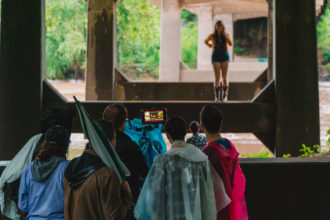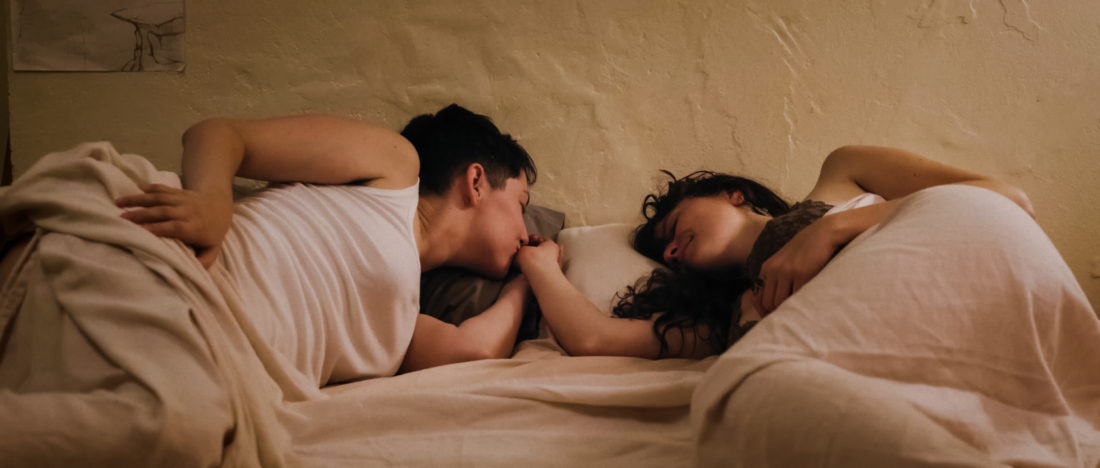Over the past few years, in the wake of the #MeToo and Time’s Up movements, members of the film and TV communities have raised awareness about harassment, assault and discrimination throughout their industries.
Turning that elevated consciousness into action, however, has proved a gradual process. But thanks to Justice Film Collective, positive change is already evident within the Asheville area. Launched in 2018, the production company seeks to shift the values of the independent film industry toward collective care, accountability and liberation, and is attracting similarly minded allies to help sustain its mission.
Problem-solving
Justice Film Collective was founded by Durham native Andie Morgenlander, who studied theater performance in college. While in school, she began auditioning for commercial projects but felt dissatisfied with the results.
“I became pretty quickly disenchanted by what the acting industry was offering me and my friends who wanted more agency with storytelling, so I decided to try some film classes,” says Morgenlander, who moved to Asheville in 2018. “I thought it would help me be a better actor as well, which I think it definitely did, but I soon fell in love with the autonomy and the collaboration that comes with directing and producing and writing.”
Further spurring Morgenlander’s evolving consciousness were frequent negative experiences in the classroom. Her directing professor (whose mindset Morgenlander describes as “very old, white Hollywood”) regularly spoke down to her and had a reputation for assigning women sexually explicit scenes that often required nudity. She says upperclassmen would warn freshmen and sophomores about that problematic culture and urge them to speak up quickly if they were uncomfortable, but little else was being done to improve matters on a systemic level. (It’s a common experience, Morgenlander later learned, for many aspiring actors in colleges and universities across the U.S.)
At the same time, Morgenlander and her classmates were being instructed that they had to be “easy to work with” if they wanted to get cast, a constriction that made many of them feel powerless in less-than-ideal situations. Though she’s encouraged by an increasing number of undergraduate arts students now fighting back against their programs’ inherently patriarchal structures, looking back, she finds it “mind-blowing” that her professors didn’t understand the impact of their actions — or, if they did, they didn’t care.
“It became more and more obvious that a lot of the injustices and systems of oppression that are active in our country in different ways on a bigger scale were also very much active within the film industry,” she says.
A better way
Committed to being a filmmaker, Morgenlander sought to change on-set culture, but the task felt daunting. Whenever she steps on set, she’s conscious of how she can subvert white dominant culture as a queer, white, gender fluid femme, while also creating a healing space and establishing pathways of communication and reporting so that if something does happen, people can find ways to get support.
“But one person can’t do all of those things, so, really quickly, I was like, ‘Well, if I’m the only one that feels this way about things and l don’t share that and nobody else does, it’s not going to help anything,’” Morgenlander says. “So my thought process became, ‘How do I start to put this ethos on paper and start to talk to people about it to see if anyone feels the same way?’”
Morgenlander, her husband (and fellow filmmaker) Joshua Overbay and a few friends began brainstorming changes that they wanted to see on sets both locally and nationally — conversations that prompted her to begin work on a sharable document for others to use. Aiding these efforts is her online pursuit of a Master of Fine Arts degree via Arizona’s Prescott College, where Morgenlander is currently writing an ethical filmmaking framework for independent film that she plans to complete this summer. Though she stresses that the work-in-progress isn’t intended as a one-size-fits-all document, its inclusion of everything from having shorter days and putting pronouns on call sheets encourage filmmakers to peruse her work’s content and see what makes sense for them.
“If you’re a director and producer, especially on independent projects, you have a lot of power and you’re at the forefront of the process,” Morgenlander says. “I wanted to make sure that, as much as I could on my sets, that I was creating space where people could hear and connect and feel cared for. I’m not perfect, and I’m still learning about how to do that, but that has been my mission.”
Discernable differences
Justice Film Collective’s approaches are already proving popular with the local filmmaking community. Julia Christgau, who wrote the LGBTQ+ short film Whistle Down Wind and co-directed it with Morgenlander in 2019, says she felt empowered by her collaborator to develop the story of best friends turned lovers in rural North Carolina. Working outside their creative partnership, however, reminds Christgau how others in the industry still have much to learn.

“I was just part of a production in New York City where the producers — they just weren’t very kind. And I think I was really shocked because of how compassionate a process it is with Andie,” Christgau says. “I got back to New York and was like, ‘Oh, no … damn it.’ That shouldn’t be the norm, but it is. And I feel like putting people’s mental health and safety first, a lot of the time it’s touted, but then [producers] don’t take measures to make sure that it’s done.”
By contrast, Morgenlander has committed to having an intimacy coach in place for the upcoming feature-length expansion of Whistle Down Wind to ensure that actors feel comfortable filming romantic scenes. In her recent return to stage acting, Christgau was reminded of the mental and physical toll that acting takes, and such caring steps give her even greater confidence in being part of future Justice Film Collective productions.
“I trust going onto that set,” Christgau says. “It feels like I’m going to be fully supported and have what I need to succeed as an artist, as opposed to showing up at a place and just hoping that everyone knows what they’re doing.”
Fellow local filmmaker Tabitha McDonald has also worked with Morgenlander on several projects. With a background that includes everything from production assistant to producer, she’s witnessed the incongruence in how creatives are treated, paid and held space for in the industry, but also sees opportunities to move away from the toxic status quo.
“By practicing filmmaking that is in alignment with their values from the development stage of filmmaking and on, they are allowing people to see that the processes can be better,” McDonald says. “Creating films can truly be a collaborative, inclusive and healing experience from day one of development. Through accountability as part of the growth process — and intentionally doing the work to move forward — change in the industry is inevitable.”
She adds that Justice Film Collective’s values closely align with hers in creating equitable and inclusive films. McDonald especially praises the emphasis her collaborators place on acknowledging the individuals who are part of the creative process of filmmaking, plus their commitment to elevate the voices of those who have historically been denied opportunities in film and other creative industries.
“Having experience working on both large and small productions, seeing this intentionality around how they navigate the creative process is refreshing,” McDonald says. “Large productions are guilty of marginalizing, overworking and undervaluing the majority of their crew. Even when the stories on screen are meant to break these patterns — nothing has changed behind the scenes. Justice Film Collective has the goal to change the narrative both in front of and behind the camera.”
Glass half full
Additional Justice Film Collective works include Spare the Child, Overbay’s documentary short about the long-term effects of childhood spanking. While the film wasn’t picked up on the 2021 festival circuit, organizations across the country that advocate for peaceful parenting have screened it in their communities. And last July, it was also shown to the Superior Tribunal de Justiça, a high court in Brazil. At that screening, Overbay and Morgenlander (with help from an interpreter) participated in a remote talkback with Overbay’s brother Archer and Trenton, N.J.-based Rev. Darrell Armstrong, an international advocate for children who appears in the film and is one of its executive producers.
That kind of engagement gives Morgenlander optimism that the collective will continue to grow and find new allies. She recently connected with Reel Works, a youth filmmaking organization in Brooklyn whose leaders are passionate about ethical and compassionate filmmaking, and she’s working on forging bonds with additional groups.
“Being able to connect with people on these ideas and hear that it’s something they’re passionate about, too, helps me feel like I’m not in a vortex doing this work,” she says. “There are people all across the United States and beyond that are trying to create more compassionate, equitable systems. And so I think for me, actually feeling small and feeling like I’m piece of a bigger body of work, gives me a lot of confidence and a lot of hope.”
To learn more, visit avl.mx/bel




Examples of why working on union signatory film and TV productions is SO IMPORTANT. Harassment is prevalent in many industries but at least the film worker’s union takes a strong stand against any type of harassment and discrimination and gives its members an opportunity to grieve the offenders. Working on small independent productions with barely experienced producers and crew can be a nightmare. I’ve worked on a few.